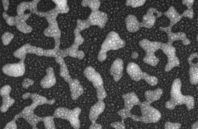A chemical sensing chip, developed for use with surface-enhanced Raman spectroscopy (SERS), has demonstrated the ability to detect the chemical fingerprint of cocaine in biological samples. In the future, the technology could be used to detect the presence of other drugs, including marijuana, and could be integrated into a hand-held, portable device for on-site testing.
The chip, which is made with low-cost materials, consists of several layers of material sitting atop one another. A sheet of dielectric material (e.g., silicon dioxide, aluminum oxide, etc.) is sandwiched between a silver mirror, which forms the base of the chip, and a hybrid nanomaterial made from silver (Ag) and gold (Au) nanoparticles. This hybrid nanostructure forms the chip’s active surface.

 (585) 768-2513
(585) 768-2513

